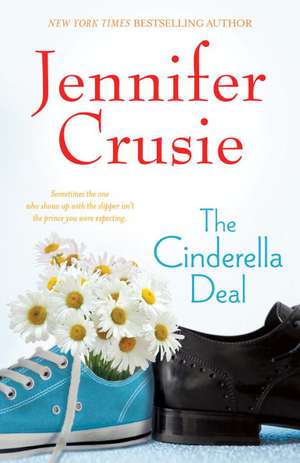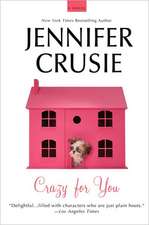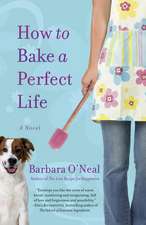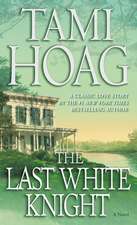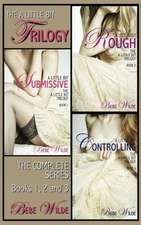The Cinderella Deal
Autor Jennifer DiGraziaen Limba Engleză Paperback – 30 sep 2011
Daisy Flattery is a free spirit with a soft spot for strays and a weakness for a good story. Why else would she agree to the outrageous charade offered by her buttoned-down workaholic neighbor, Linc Blaise? The history professor needs a makeshift fiancée to secure his dream job, and Daisy needs a short-term gig to support her painting career. And so the Cinderella Deal is born: Daisy will transform herself into Linc’s prim-and-proper fiancée, and at the stroke of midnight they will part ways, no glass slippers attached. But something funny happens on their way to make-believe bliss, as a fake engagement unexpectedly spirals into an actual wedding. Now, with Linc and Daisy married and under one roof, what started as a game begins to feel real—and the people who seem so wrong for each other realize they may truly be just right.
Preț: 109.65 lei
Nou
Puncte Express: 164
Preț estimativ în valută:
20.98€ • 21.97$ • 17.36£
20.98€ • 21.97$ • 17.36£
Carte tipărită la comandă
Livrare economică 05-19 aprilie
Preluare comenzi: 021 569.72.76
Specificații
ISBN-13: 9780345530660
ISBN-10: 0345530667
Pagini: 209
Dimensiuni: 135 x 203 x 15 mm
Greutate: 0.19 kg
Editura: Bantam
ISBN-10: 0345530667
Pagini: 209
Dimensiuni: 135 x 203 x 15 mm
Greutate: 0.19 kg
Editura: Bantam
Notă biografică
Jennifer Crusie is the bestselling and award-winning author of more than fifteen contemporary novels. Her work has been published in twenty countries.
From the Paperback edition.
From the Paperback edition.
Extras
Chapter One
The storm raged dark outside, the light in the hallway flickered, and Lincoln Blaise cast a broad shadow over the mailboxes, but it didn’t matter. He knew by heart what the card on the box above his said:
Daisy Flattery
Apartment 1B
Stories Told, Ideas Illminated
Unreal but Not Untrue
Linc frowned at the card, positive it didn’t belong on a mailbox in the dignified old house he shared with three other tenants. That was why he’d rented the apartment in the first place: it had dignity. Linc liked dignity the way he liked calm and control and quiet. It had taken him a long time to get all of those things into his life and into one apartment. Then he’d met his downstairs neighbor.
His frown deepened as he remembered the first time he’d seen Daisy Flattery in the flesh, practically hissing at him as he shooed a cat away from his rebuilt black Porsche, her dark, frizzy hair crackling around her face like lightning. Later sightings hadn’t improved his first impression, and the memory of them didn’t improve his mood now. She wore long dresses in electric colors, and since she was tall, they were very long, and she was always scowling at him, her heavy brows drawn together under that dumb blue velvet hat she wore pulled down around her ears even in the summer. She looked like somebody from Little House on the Prairie on acid, which was why he usually took care to ignore her.
But now, staring down at the card on her mailbox, appropriately backlit by the apocalyptic storm, he knew there was a possibility he might actually have to get to know her. And it was his own damn fault.
The thought gave him a headache, so he shoved his mail into his jacket pocket and went up the stairs to his apartment and his aspirin.
Downstairs, Daisy Flattery frowned too, and cocked her head to try to catch again the sound she’d heard. It had been something between a creaking door and a cat in trouble. She looked over at Liz to see if she was showing signs of life, but Liz was, as usual, a black velvet blob stretched out on the end table Daisy had rescued from a trash heap two streets over. The cat basked in the warmth from the cracked crystal lamp Daisy had found at Goodwill for a dollar. The three made a lovely picture, light and texture and color, silky fur and smooth wood and warm lamp glow. Unbelievably, fools had thrown away all three; sometimes the blindness of people just amazed Daisy.
“Hello?” The petite blonde across the chipped oak table from Daisy waved her hand. “You there? You have the gooniest look on your face.”
“I thought I heard something,” Daisy told her best friend. “Never mind. Where was I? Oh, yeah. I’m broke.” She shrugged at Julia across from her. “Nothing new.”
“Well, you’re depressed about it. That’s new.” Julia took a sugar cookie from the plate in front of her and shoved the rest toward Daisy with one manicured hand, narrowly missing Daisy’s stained glass lamp. The lamp was another find: blue, green, and yellow Tiffany pieces with a crack in one that had made it just possible for her to buy it. The crack had been the clincher for Daisy: with the crack, the lamp had a history, a story; it was real. Sort of like her hands, she tried to tell herself as she compared them to Julia’s. Blunt, paint-stained, no two nails the same length. Interesting. Real.
Julia, as usual, had missed color and pattern completely and was still on words. “Also, you’re the one who has to come up with the bucks for the feline senior cat chow. I should eat so good.”
“Right.” Daisy scrunched up her face. She hated thinking about money, which was probably why she hadn’t had much for the past four years. “Maybe leaving teaching wasn’t such a good idea.”
Julia straightened so fast, Liz opened an eye again.
“Are you kidding? This is new. I can’t believe you’re doubting yourself.” She leaned across the table to stare into Daisy’s eyes. “Get a grip. Make some tea to go with these cookies. Tell me a story. Do something weird and unpractical so I’ll know you’re Daisy Flattery.”
“Very funny.” Daisy pushed her chair back and went to find tea bags and her beat-up copper teakettle. She was sure the tea bags were in one of the canisters on the shelf, but the kettle could be anywhere. She opened the bottom cupboard and started pawing through the pans, books, and paintbrushes that had somehow taken up housekeeping together.
“I’m not kidding.” Julia followed her to the sink. “I’ve known you for twelve years, and this is the first time I’ve heard you say you can’t do something.”
Daisy was so outraged at the thought that she pulled her head out of the cupboard without giving herself enough clearance and smacked herself hard. “Ouch.” She rubbed her head through her springy curls. “I’m not saying I can’t make it as an artist.” Daisy stuck her head back into the cabinet and shoved aside her cookie sheets long enough to find her teakettle and yank it out. “I believe in myself. I just may have moved too fast.” She got up and filled the kettle from the faucet.
“Well, it’s not like you ever move slow.” Julia took down canisters one by one, finally finding the tea in a brown and silver square can. “Why did you put the tea in the can that says ‘cocoa’? Never mind. Constant Comment or Earl Grey?”
“Earl Grey.” Daisy put the kettle on the stove and turned up the heat. “This is a serious moment, and I need a serious tea.”
“Which is why I’m drinking Constant Comment.” Julia waggled her long fingers inside the canister and fished out two tea bags. “I have no serious moments.”
“Well, pretend you’re having one for me.” Daisy sighed, envying Julia’s optimism. Of course, Julia hadn’t quit a safe and solid teaching job to become a painter, or spent the past four years living on her savings until she didn’t have any. Daisy felt her head pound. “Julia, I don’t think I can do this anymore. I’m tired of scraping to pay my bills, and I’m tired of trying to sell my paintings to people who don’t understand what I’m doing, and I’m tired—” She bit her lip. “I’m so tired of worrying about everything.” That was the thing, really; she was worn down from the uncertainty. Like water on a rock; that was what the edge of poverty did to you.
“So what are you going to do?” Julia asked, but somewhere there was a faint sound, half screech and half meow, and Daisy cocked her head again instead of answering.
“I swear I hear a cat crying,” she told Julia. “Listen. Do you hear anything?”
Julia paused and then shook her head. “Uh-uh. Your water’s starting to boil. Maybe that’s it.”
Daisy took the kettle off while Julia took down two mismatched cups and saucers, plunking her Constant Comment tea bag in a Blue Willow cup and Daisy’s Earl Grey in the bright orange Fiestaware. Daisy poured the hot water over the bags and said, “Pretty” as the tea color spread through the cups.
“Forget the pretty tea.” Julia picked up her cup and carried it back to the table. “You’re in crisis here. You’re out of money and you can’t sell your paintings. How’s the storytelling going?”
“Budget cuts.” Daisy sat down across from her with her own cup and saucer. “Most libraries can’t afford me, and it’s a slow time for bookstores, and forget schools entirely. They all say I’m very popular and they’ll use me again as soon as possible, but in the meantime I’m out of luck.”
“Okay.” Julia crinkled her nose as she thought. “How else were you making money? Oh, the jewelry. What about the jewelry?”
Daisy winced with guilt. “That’s selling, but Howard won’t give me the money until the end of the month. And he owes me from the end of last month, but he’s holding on to that too. It’s not that much, about a hundred, but it would help.” She knew she should go in and demand her jewelry money, but the thought of Howard sneering at her wasn’t appealing. He looked so much like her father that it was like every summer she’d ever spent with him condensed into two minutes.
Julia frowned at her. “So how much do you need? To keep the wolf from the door, I mean.”
Daisy sighed. “About a thousand. Last month’s rent, this month’s rent, and expenses. That would get me to when Howard pays and then maybe something else would turn up.” That sounded pathetic, so she took a deep breath and started again. “The thing is, I quit so I could paint, but I’m spending all my time trying to support myself instead of concentrating on my work. I thought I’d have a show by now, but nobody understands what I’m doing. And even though I almost have enough paintings for a show, I’m not sure what I’m doing is right for who am I now anyway.”
Julia sipped her tea. “Ouch. Hot. Blow on yours first. What do you mean, you’re not sure what you’re doing is right? I love your paintings. All those details.”
“Well, that’s it.” Daisy shoved her tea away to lean closer. “I like the details too, but I’ve done them. I think I need to stretch, to try things that are harder for me, but I can’t afford to. I’m building my reputation on primitive narrative paintings; I can’t suddenly become an abstract expressionist.”
Julia made a face. “That’s what you want to do?”
“No.” Daisy shut her eyes, trying to see the paintings she wanted to do, paintings with the emotions in the brushstrokes instead of in the tiny painted details, thick slashes of paint instead of small, rich dots. “I need to work larger. I need—”
The mewling cry that had teased her earlier came again, louder. “That is definitely a cat,” Daisy said, and went to open the window.
The wind exploded in and stirred Daisy’s apartment into even more chaos than usual. Liz rolled to her feet and meowed her annoyance, but Daisy ignored her and leaned out into the storm.
Two bright eyes stared up at her from under the bush beneath her window.
“You stay right there,” she told them, and ran for the apartment door.
“Daisy?” Julia called after her, but she let the door bang behind her and ran out into the rain. Whatever it was had vanished, and Daisy got down on her hands and knees in the mud to peer under the bush.
A kitten peered back, soaked and mangy and not at all happy to see her. Daisy reached for it and got clawed for her pains. “I’m rescuing you, dummy,” she told it when she’d hauled it out from under the bush and it was squirming against her. “Stop fighting me.”
Once inside, she wrapped the soaked little body in a dish towel while Julia and Liz looked at it with equal distaste.
“It looks like a rat,” Julia said. “I can’t believe it. You rescued a rat.”
Liz hissed, and when Daisy toweled the kitten dry, it hissed too.
“It’s a calico kitten.” Daisy got down on her knees so she could go eye to eye with the towel-wrapped little animal on the table. “You’re okay now.”
The mottled kitten glared at her and screeched its meow with all the melody of a fingernail down a blackboard.
“Just what you needed. Another mouth to feed,” Julia said, and the kitten screeched at her too. “And what a mouth it is.” Julia shot a sympathetic look at Liz. “If you want to come live with me, I understand,” she told the cat. “I know you’re legally dead, but even you must draw the line at living with a rat.”
Liz glared at the kitten one more time and then curled up under the light and went back to sleep.
“A kitten doesn’t eat much,” Daisy said, and went to get food. She found a can of tuna on the shelf over the stove, stuck behind her copy of Grimms’ fairy tales, a jar of alizarin crimson acrylic paint, and her cinnamon. She took down the can and called back to Julia. “Want some tuna?”
“No. I just came over to bring you the cookies, and then I got distracted.” Julia and the kitten looked at each other with equal distaste. “You know, this is not a happy rat.”
From the Paperback edition.
The storm raged dark outside, the light in the hallway flickered, and Lincoln Blaise cast a broad shadow over the mailboxes, but it didn’t matter. He knew by heart what the card on the box above his said:
Daisy Flattery
Apartment 1B
Stories Told, Ideas Illminated
Unreal but Not Untrue
Linc frowned at the card, positive it didn’t belong on a mailbox in the dignified old house he shared with three other tenants. That was why he’d rented the apartment in the first place: it had dignity. Linc liked dignity the way he liked calm and control and quiet. It had taken him a long time to get all of those things into his life and into one apartment. Then he’d met his downstairs neighbor.
His frown deepened as he remembered the first time he’d seen Daisy Flattery in the flesh, practically hissing at him as he shooed a cat away from his rebuilt black Porsche, her dark, frizzy hair crackling around her face like lightning. Later sightings hadn’t improved his first impression, and the memory of them didn’t improve his mood now. She wore long dresses in electric colors, and since she was tall, they were very long, and she was always scowling at him, her heavy brows drawn together under that dumb blue velvet hat she wore pulled down around her ears even in the summer. She looked like somebody from Little House on the Prairie on acid, which was why he usually took care to ignore her.
But now, staring down at the card on her mailbox, appropriately backlit by the apocalyptic storm, he knew there was a possibility he might actually have to get to know her. And it was his own damn fault.
The thought gave him a headache, so he shoved his mail into his jacket pocket and went up the stairs to his apartment and his aspirin.
Downstairs, Daisy Flattery frowned too, and cocked her head to try to catch again the sound she’d heard. It had been something between a creaking door and a cat in trouble. She looked over at Liz to see if she was showing signs of life, but Liz was, as usual, a black velvet blob stretched out on the end table Daisy had rescued from a trash heap two streets over. The cat basked in the warmth from the cracked crystal lamp Daisy had found at Goodwill for a dollar. The three made a lovely picture, light and texture and color, silky fur and smooth wood and warm lamp glow. Unbelievably, fools had thrown away all three; sometimes the blindness of people just amazed Daisy.
“Hello?” The petite blonde across the chipped oak table from Daisy waved her hand. “You there? You have the gooniest look on your face.”
“I thought I heard something,” Daisy told her best friend. “Never mind. Where was I? Oh, yeah. I’m broke.” She shrugged at Julia across from her. “Nothing new.”
“Well, you’re depressed about it. That’s new.” Julia took a sugar cookie from the plate in front of her and shoved the rest toward Daisy with one manicured hand, narrowly missing Daisy’s stained glass lamp. The lamp was another find: blue, green, and yellow Tiffany pieces with a crack in one that had made it just possible for her to buy it. The crack had been the clincher for Daisy: with the crack, the lamp had a history, a story; it was real. Sort of like her hands, she tried to tell herself as she compared them to Julia’s. Blunt, paint-stained, no two nails the same length. Interesting. Real.
Julia, as usual, had missed color and pattern completely and was still on words. “Also, you’re the one who has to come up with the bucks for the feline senior cat chow. I should eat so good.”
“Right.” Daisy scrunched up her face. She hated thinking about money, which was probably why she hadn’t had much for the past four years. “Maybe leaving teaching wasn’t such a good idea.”
Julia straightened so fast, Liz opened an eye again.
“Are you kidding? This is new. I can’t believe you’re doubting yourself.” She leaned across the table to stare into Daisy’s eyes. “Get a grip. Make some tea to go with these cookies. Tell me a story. Do something weird and unpractical so I’ll know you’re Daisy Flattery.”
“Very funny.” Daisy pushed her chair back and went to find tea bags and her beat-up copper teakettle. She was sure the tea bags were in one of the canisters on the shelf, but the kettle could be anywhere. She opened the bottom cupboard and started pawing through the pans, books, and paintbrushes that had somehow taken up housekeeping together.
“I’m not kidding.” Julia followed her to the sink. “I’ve known you for twelve years, and this is the first time I’ve heard you say you can’t do something.”
Daisy was so outraged at the thought that she pulled her head out of the cupboard without giving herself enough clearance and smacked herself hard. “Ouch.” She rubbed her head through her springy curls. “I’m not saying I can’t make it as an artist.” Daisy stuck her head back into the cabinet and shoved aside her cookie sheets long enough to find her teakettle and yank it out. “I believe in myself. I just may have moved too fast.” She got up and filled the kettle from the faucet.
“Well, it’s not like you ever move slow.” Julia took down canisters one by one, finally finding the tea in a brown and silver square can. “Why did you put the tea in the can that says ‘cocoa’? Never mind. Constant Comment or Earl Grey?”
“Earl Grey.” Daisy put the kettle on the stove and turned up the heat. “This is a serious moment, and I need a serious tea.”
“Which is why I’m drinking Constant Comment.” Julia waggled her long fingers inside the canister and fished out two tea bags. “I have no serious moments.”
“Well, pretend you’re having one for me.” Daisy sighed, envying Julia’s optimism. Of course, Julia hadn’t quit a safe and solid teaching job to become a painter, or spent the past four years living on her savings until she didn’t have any. Daisy felt her head pound. “Julia, I don’t think I can do this anymore. I’m tired of scraping to pay my bills, and I’m tired of trying to sell my paintings to people who don’t understand what I’m doing, and I’m tired—” She bit her lip. “I’m so tired of worrying about everything.” That was the thing, really; she was worn down from the uncertainty. Like water on a rock; that was what the edge of poverty did to you.
“So what are you going to do?” Julia asked, but somewhere there was a faint sound, half screech and half meow, and Daisy cocked her head again instead of answering.
“I swear I hear a cat crying,” she told Julia. “Listen. Do you hear anything?”
Julia paused and then shook her head. “Uh-uh. Your water’s starting to boil. Maybe that’s it.”
Daisy took the kettle off while Julia took down two mismatched cups and saucers, plunking her Constant Comment tea bag in a Blue Willow cup and Daisy’s Earl Grey in the bright orange Fiestaware. Daisy poured the hot water over the bags and said, “Pretty” as the tea color spread through the cups.
“Forget the pretty tea.” Julia picked up her cup and carried it back to the table. “You’re in crisis here. You’re out of money and you can’t sell your paintings. How’s the storytelling going?”
“Budget cuts.” Daisy sat down across from her with her own cup and saucer. “Most libraries can’t afford me, and it’s a slow time for bookstores, and forget schools entirely. They all say I’m very popular and they’ll use me again as soon as possible, but in the meantime I’m out of luck.”
“Okay.” Julia crinkled her nose as she thought. “How else were you making money? Oh, the jewelry. What about the jewelry?”
Daisy winced with guilt. “That’s selling, but Howard won’t give me the money until the end of the month. And he owes me from the end of last month, but he’s holding on to that too. It’s not that much, about a hundred, but it would help.” She knew she should go in and demand her jewelry money, but the thought of Howard sneering at her wasn’t appealing. He looked so much like her father that it was like every summer she’d ever spent with him condensed into two minutes.
Julia frowned at her. “So how much do you need? To keep the wolf from the door, I mean.”
Daisy sighed. “About a thousand. Last month’s rent, this month’s rent, and expenses. That would get me to when Howard pays and then maybe something else would turn up.” That sounded pathetic, so she took a deep breath and started again. “The thing is, I quit so I could paint, but I’m spending all my time trying to support myself instead of concentrating on my work. I thought I’d have a show by now, but nobody understands what I’m doing. And even though I almost have enough paintings for a show, I’m not sure what I’m doing is right for who am I now anyway.”
Julia sipped her tea. “Ouch. Hot. Blow on yours first. What do you mean, you’re not sure what you’re doing is right? I love your paintings. All those details.”
“Well, that’s it.” Daisy shoved her tea away to lean closer. “I like the details too, but I’ve done them. I think I need to stretch, to try things that are harder for me, but I can’t afford to. I’m building my reputation on primitive narrative paintings; I can’t suddenly become an abstract expressionist.”
Julia made a face. “That’s what you want to do?”
“No.” Daisy shut her eyes, trying to see the paintings she wanted to do, paintings with the emotions in the brushstrokes instead of in the tiny painted details, thick slashes of paint instead of small, rich dots. “I need to work larger. I need—”
The mewling cry that had teased her earlier came again, louder. “That is definitely a cat,” Daisy said, and went to open the window.
The wind exploded in and stirred Daisy’s apartment into even more chaos than usual. Liz rolled to her feet and meowed her annoyance, but Daisy ignored her and leaned out into the storm.
Two bright eyes stared up at her from under the bush beneath her window.
“You stay right there,” she told them, and ran for the apartment door.
“Daisy?” Julia called after her, but she let the door bang behind her and ran out into the rain. Whatever it was had vanished, and Daisy got down on her hands and knees in the mud to peer under the bush.
A kitten peered back, soaked and mangy and not at all happy to see her. Daisy reached for it and got clawed for her pains. “I’m rescuing you, dummy,” she told it when she’d hauled it out from under the bush and it was squirming against her. “Stop fighting me.”
Once inside, she wrapped the soaked little body in a dish towel while Julia and Liz looked at it with equal distaste.
“It looks like a rat,” Julia said. “I can’t believe it. You rescued a rat.”
Liz hissed, and when Daisy toweled the kitten dry, it hissed too.
“It’s a calico kitten.” Daisy got down on her knees so she could go eye to eye with the towel-wrapped little animal on the table. “You’re okay now.”
The mottled kitten glared at her and screeched its meow with all the melody of a fingernail down a blackboard.
“Just what you needed. Another mouth to feed,” Julia said, and the kitten screeched at her too. “And what a mouth it is.” Julia shot a sympathetic look at Liz. “If you want to come live with me, I understand,” she told the cat. “I know you’re legally dead, but even you must draw the line at living with a rat.”
Liz glared at the kitten one more time and then curled up under the light and went back to sleep.
“A kitten doesn’t eat much,” Daisy said, and went to get food. She found a can of tuna on the shelf over the stove, stuck behind her copy of Grimms’ fairy tales, a jar of alizarin crimson acrylic paint, and her cinnamon. She took down the can and called back to Julia. “Want some tuna?”
“No. I just came over to bring you the cookies, and then I got distracted.” Julia and the kitten looked at each other with equal distaste. “You know, this is not a happy rat.”
From the Paperback edition.
Recenzii
Praise for Jennifer Crusie
“Crusie’s talent [is] for writing wacky romantic plots that shine with generous amounts of humor and enormous good cheer.”—Library Journal, on Faking It
“With humor, irony and a whole lot of wit, Jennifer Crusie straps in her readers and takes them on a memorable ride. . . . She is a masterful storyteller.”—Romantic Times, on Fast Women
“Crusie’s talent [is] for writing wacky romantic plots that shine with generous amounts of humor and enormous good cheer.”—Library Journal, on Faking It
“With humor, irony and a whole lot of wit, Jennifer Crusie straps in her readers and takes them on a memorable ride. . . . She is a masterful storyteller.”—Romantic Times, on Fast Women
Descriere
Crusie brings humor and storytelling magic to this modern-day romance about a match with a dubious beginning--that is destined for a fairy-tale ending. Daisy Flattery is a free spirit with a soft spot for strays and a weakness for a good story. Why else would she agree to the outrageous charade offered by her buttoned-down workaholic neighbor, Linc Blaise?
